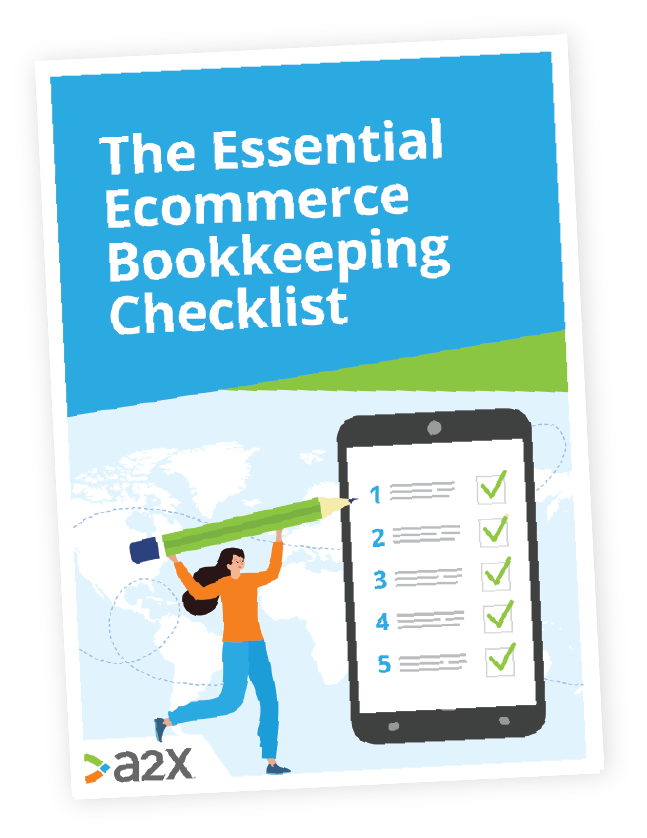
Ecommerce Accounting Explained: Accounting for Foreign Currency
This article was written by our friends at Airwallex. Check out www.airwallex.com to find out more about how their international banking services can help your ecommerce business to thrive.
So you’ve launched your ecommerce store and the orders are coming in.
It’s a great feeling.
But you’re keen to really expand. And selling overseas might be the best way to do it.
Breaking into a new market is a great way for business owners to explore their untapped growth potential.
But it brings the added complexity of foreign currency.
Where are you going to hold it? How are you going to put it to use? And most importantly, how will you record it?
We’ll go over the basics of what you should look out for and tips on how to make the accounting process easier so you can focus on your sales.
In this guide to accounting for foreign currency:
Table of Contents
Want to feel completely confident in your ecommerce bookkeeping?
Businesses that document their processes grow faster and make more profit. Download our free checklist to get all of the essential ecommerce bookkeeping processes you need every week, month, quarter, and year.
Download it here
Accounting for foreign currency
Here’s what you should look out for when reconciling your foreign currency accounting.
1. Foreign transaction fees
Your bank and payment processors typically start charging you foreign transaction fees when you start doing business abroad.
These fees are mostly levied on the buyer, but they can still be charged to the seller.
This is a concern if you want to work with foreign contractors or suppliers.
These fees are charged because transferring money abroad requires more admin work and higher turnaround times.
These fees are often hard to catch during record keeping. Sometimes you won’t know until you’re looking at your monthly statement.
So, why is it important to keep track of these fees?
They’re typically a tax-deductible expense. If you’re going to be paying them, you might as well save money on your tax bill.
2. Subprime exchange rates
In some cases, the difference in foreign exchange (FX) rates doesn’t save much money.
For example, you only save half a percent when exchanging 10 euros to dollars.
But when you start collecting foreign currency in larger quantities, it has a more significant impact.
It’s smarter to look into financial institutions that have experience with foreign transactions.
For example, if you’re working with a local credit union, they’re likely to offer you a subprime exchange rate. It’s harder for them than bigger banks to keep up with the changes.
Since most of your money is moving around online, it’s better to consider an online-only bank.
Airwallex offers Global Business Accounts that are built from the ground up to provide the best user experience for clients looking to send and receive money abroad with minimal fees.
3. Currency gains and loss
Prior to people buying and selling cryptocurrency for profit, similar things were happening with foreign currency.
People profiting from fluctuating FX rates need to follow certain rules and regulations when declaring gains or losses on holding a foreign currency.
Any gains you make on foreign currency must be reported to the IRS as part of your tax return.
How to simplify your foreign currency accounting
Here are our top tips for accounting for foreign currency.
1. Hire an experienced bookkeeper
Ecommerce bookkeepers are experts in their field.
You can rest easy knowing you have the best skills and knowledge working on your business.
If you’re going to start selling abroad, it makes sense to have a bookkeeper who has experience with similar businesses.
2. Consult with other entrepreneurs
The most valuable advice you can get is from other business owners who have been there, done that.
Whether it’s through social media, forums, or specific organizations, your peers are everywhere. They can also help you navigate the legislation, rules, and sales tax levied against foreign sellers so you aren’t blindsided by unexpected costs.
Simply put, there’s much more to navigate when expanding abroad than just accounting. So get support where you can.
3. Prioritize money management
The best thing you can do when collecting foreign currency is to have a plan in place for how you’re going to manage it.
If you’re not careful, you’ll easily rack up fees and lose track of your funds.
Fortunately, platforms exist that are specifically designed for business owners looking to take their operations abroad.
Transferring your funds to a platform such as Airwallex will help you save on transaction fees while better managing your money.
Working with foreign currency might seem scary at first. But if you invest time into creating a path for success, your business will reap the rewards.
Sign up with Airwallex to streamline your accounting
Airwallex offers crystal clear financial reporting with a dashboard of all your foreign currency accounts listed in a single space.
This makes it easier to get a snapshot of your business’s capital in an instant without bouncing back and forth from multiple accounts.
You’ll also benefit from quicker transfers, integrations with the platforms you already use, and market-beating exchange fees.
If you’re worried about foreign currency management, sign up with Airwallex.
We’ll help you streamline your workload to facilitate smoother operations.
Want to feel completely confident in your ecommerce bookkeeping?
Businesses that document their processes grow faster and make more profit. Download our free checklist to get all of the essential ecommerce bookkeeping processes you need every week, month, quarter, and year.
Download it here
